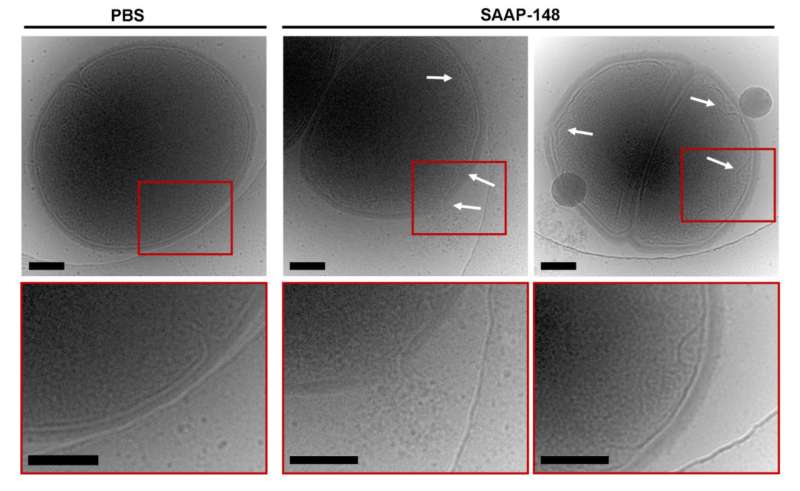January 11, 2018 report
Optimized human peptide found to be an effective antibacterial agent

A team of researchers in the Netherlands has developed an effective antibacterial ointment based on an optimized human peptide. In their paper published in the journal Science Translational Medicine, the group describes developing the synthetic peptide and how well it worked when tested in the lab.
As the search continues for alternatives to antibacterial drugs that have succumbed to antibiotic resistance, researchers look to the human immune system to see if there might be a way to bolster its strength. In this new effort, the researchers looked at a peptide called LL-37, which is known to help in regulating the immune system in humans and to have bacteria killing properties. The team gave it more strength by shortening its amino acid chain and changing some of its building blocks. The result was a bacteria-killing synthetic peptide called SAAP-148. It is able to kill bacteria, the team notes, by piercing their membranes.
The team added the peptide to an ointment and applied it to a biofilm covering a sample of human skin in a petri dish and to wounds on the backs of mice. Doing so, the researchers found, cleared two serious types of bacteria—a strain of MRSA called Staphylococcus aureus and Acinetobacter baumannii, which has become resistant to most current antibiotics. Notably, the ointment was also able to treat biofilms as easily as outlier infections. Biofilms are notoriously difficult to deal with because they shield bacteria from antibacterial agents. Notably, neither of the bacteria types tested developed resistance to the peptide even after repeated exposure. And as if all that were not enough, the peptide also overcame a big problem with other antibacterial drugs—the tendency to become bogged down in blood proteins and lipids, which prevent them from reaching an infection site.
The researchers will continue testing the ointment on other types of infections and bacteria, even as they prepare for clinical trials that will test its effectiveness against atopic dermatitis and infections in burn wounds. They are also looking to see if it might be possible to create an injectable drug containing the peptide that could fight infections inside the body.
More information: Anna de Breij et al. The antimicrobial peptide SAAP-148 combats drug-resistant bacteria and biofilms, Science Translational Medicine (2018). DOI: 10.1126/scitranslmed.aan4044
Abstract
Development of novel antimicrobial agents is a top priority in the fight against multidrug-resistant (MDR) and persistent bacteria. We developed a panel of synthetic antimicrobial and antibiofilm peptides (SAAPs) with enhanced antimicrobial activities compared to the parent peptide, human antimicrobial peptide LL-37. Our lead peptide SAAP-148 was more efficient in killing bacteria under physiological conditions in vitro than many known preclinical- and clinical-phase antimicrobial peptides. SAAP-148 killed MDR pathogens without inducing resistance, prevented biofilm formation, and eliminated established biofilms and persister cells. A single 4-hour treatment with hypromellose ointment containing SAAP-148 completely eradicated acute and established, biofilm-associated infections with methicillin-resistant Staphylococcus aureus and MDR Acinetobacter baumannii from wounded ex vivo human skin and murine skin in vivo. Together, these data demonstrate that SAAP-148 is a promising drug candidate in the battle against antibiotic-resistant bacteria that pose a great threat to human health.
© 2018 Phys.org



















